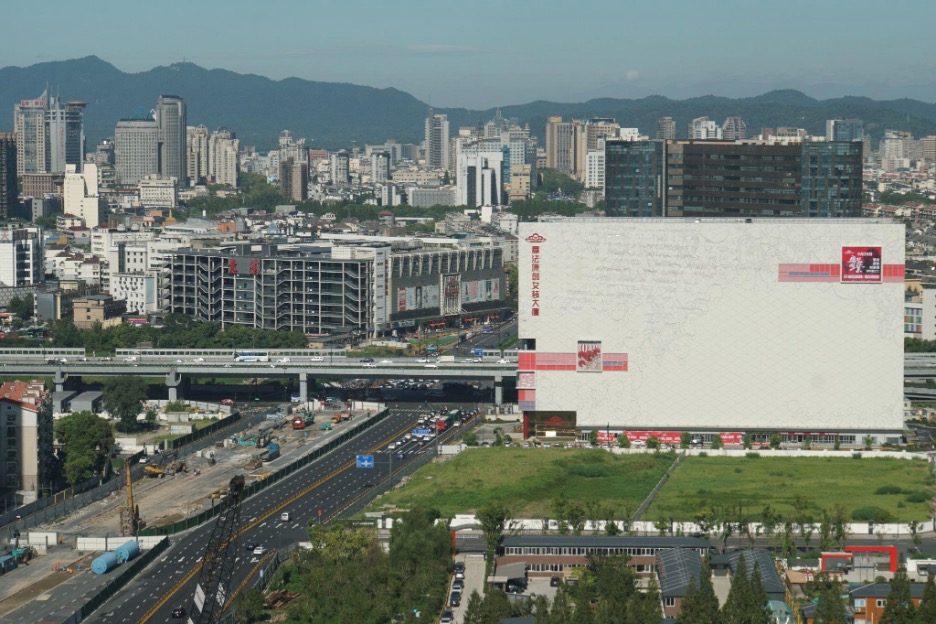
Set on the southern bank of Hangzhou’s Qiantang River, as it winds past the storied ancient capital before emptying out into Hangzhou Bay, Lijing International Center (丽晶国际) stands out in a number of ways. Behind its glassy, 40-storey facade is over 300,000 square meters of office and living space — a building big enough, it boasts, “to accommodate a town.” Even among the glittering towers of Qianjiang Century City (钱江世纪城), a new tech and innovation hub built for the 2022 Asian Games, its distinctive “S” shape leaves a unique footprint.
It’s also acquired a memorable moniker: “Influencer Tower” (网红大楼). That’s because it’s reputed to be home base for a disproportionate amount of wanghong (网红) or Chinese internet celebrities. In a fascinating feature this week, Shanghai-based digital news outlet The Paper (澎湃新闻) spoke to some of the building’s terminally online residents, tracking, through their stories, the fleeting fortunes of online fame and the rapidly shifting e-commerce landscape.
When the Going Was Good
Lijing International Center is conveniently located near Qianjiang Century City station on the Hangzhou Metro, where lines 2 and 6 converge, offering direct links to the historic city center and Hangzhou East train station, a high-speed rail hub connecting Hangzhou and Shanghai. “In addition to its attention-grabbing appearance,” The Paper writes, Lijing International Center “has been rumored online that this is a home base for netizens, with numerous netizens engaged in the live-streaming industry making their home in the building.”

The report says the building has become a symbol of the strength of Hangzhou’s booming livestreaming sector. According to numbers provided by Zhejiang’s commerce department, livestreaming now employs, directly or indirectly, more than one million people in the provincial capital, which hosts an estimated 50,000 online anchors (主播) and more than 5,000 registered companies in the sector.
“This means that one out of every 244 people in Hangzhou is an anchor,” The Paper calculates, “and one out of every 12 people is engaged in live broadcast-related industries.”
But not all is well in this super-sized hype house. One longtime tenant, livestreamer Chen Yifei (陈怡斐), tells The Paper that Lijing International Center’s once bustling and lively atmosphere has suddenly disappeared, “as if the building itself has withered away.”
Chen purchased five units all at once in the development four years ago, investing vast sums of money to transform the properties into livestreaming studios. Back then, the going was good. At the height of her business, Chen told The Paper, she was recording an annual turnover of several billion yuan. The boomtime for social shopping began in 2016 with the launch of Taobao Live (淘宝直播), the online shopping giant’s e-commerce platform. “Livestreaming then was very simple compared to now,” Chen recalls. “As long as the anchor sat in front of the camera and said a few words, we made money.” Being in Hangzhou, the hometown of Taobao and its parent company Alibaba, also meant livestreamers were as close as possible to the action.
Just a few years later, in 2023, she decided to pause her livestreaming business because fierce competition and a lack of market standards were driving down profitability.
Decline and Fall
At peak occupancy, local resident Zhang Bin (张斌) recently told the magazine China Newsweek (中国新闻周刊), Lijing International Center was home to as many as 18,000 people. Now the number of residents has dropped to below 8,000.
The building was never intended to become an “Influencer Tower,” according to Zhang, who manages a nearby estate. But construction was completed just in time for the e-commerce livestreaming gold rush. With the surrounding Asian Games village and Qianjiang Central Business District still under construction, Lijing offered a low-rent, up-and-coming foothold in the nation’s e-commerce capital. It also happens to be just across the river from huge garment wholesale markets like Sijiqing (四季青服裝市場) and Hangpai (杭派精品服裝市場) with tens of thousands of merchants. As the development’s reputation grew online, more and more aspiring wanghongs were drawn in.

Cracks began to show as this spirit of collaboration degenerated into cutthroat competition. For Chen Yifei, “the most depressing thing” about livestreaming became the competitors that had now become her neighbors as well. “Vicious competition” among her peers erupted into bitter price wars and the constant plagiarization of each other’s successful products. Anchors and brands were all at one another’s throats, and profit margins kept shrinking.
Livestreaming remains big business in China, drawing in more than half the country’s total internet users and accounting for hundreds of millions of dollars in sales every year. But it’s no longer the free-for-all it once was. Now, it’s a plaything for big celebrities and brands. It used to take no more than a phone and a ring light to launch a successful social shopping venture; now it takes a whole production team. If Hangzhou was once a gold mine, it’s now a “battlefield.”
If Hangzhou was once a gold mine, it’s now a “battlefield.”
And if Lijing’s location at the heart of Hangzhou’s shiny new Central Business District once seemed ideal, it now looks more like a liability. For these ever-bigger operations, it makes more sense to set up shop in the suburbs where land is cheaper and more abundant, where they can run bigger studios with dozens of staff and at the same time find warehouses to store all of their inventory.
The “livestreaming dream,” The Paper suggests, is over — replaced by the livestreaming industrial complex. Past its prime less than a decade after it was built, Hangzhou’s “Influencer Tower” stands less as a hive for the industry and more as a glistening monument to what it once was.




















